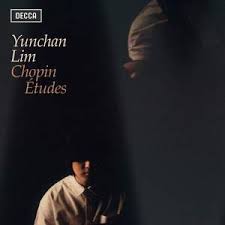CHOPIN Études (Yunchan Lim)
View record and artist detailsRecord and Artist Details
Genre:
Instrumental
Label: Decca
Magazine Review Date: 05/2024
Media Format: CD or Download
Media Runtime: 58
Mastering:
DDD
Catalogue Number: 487 0122

Tracks:
| Composition | Artist Credit |
|---|---|
| Etudes |
Fryderyk Chopin, Composer
Yunchan Lim, Piano |
Author: David Fanning
Ever since Yunchan Lim became the youngest-ever winner of the Van Cliburn Gold Medal in June 2022, the piano grapevine has been buzzing with news of his prowess. Audiences in Fort Worth were blown away by his Rachmaninov Third Concerto in the final round, as they had been by his complete Liszt Transcendental Studies in the semi-final, the latter now available as a live recording and reviewed in lavish superlatives by Jeremy Nicholas in these pages (Steinway & Sons, 9/23).
No surprise, then, that the now 20-year-old Korean has been signed up by Decca. And no real dissent from me over the accompanying hype. Admittedly, I wouldn’t take ‘the classical answer to K‑Pop’ as the most flattering of endorsements. But that’s no criticism of Lim, only of Decca’s marketing. His Chopin is as flexible and feather-light as it is fluent and fiery, as compelling in its sense of structure as in its relishing of detail. The whole experience radiates joyful, youthful exuberance. And lest anyone hold his age against him, let’s not forget that Chopin himself was not that much older when he composed the pieces.
Not all the jury members were equally ecstatic over Lim’s Van Cliburn appearances, and I can just about understand why. His instincts incline him towards tempestuousness at one extreme and to old‑style dislocation of hands at the other. He seizes almost too rapaciously on Chopin’s il più forte possibile in the octaves and arpeggios of Op 25 Nos 10 and 12, and in the latter instance he goes against most published scores in his placing of melodic accents. His impish teasing out of inner voices in the notoriously treacherous A minor Op 10 No 2 is eyebrow-raising, perhaps even frown-inducing for the purist, and it proves a taste of things to come as he revels in similar playfulness in places where most others are at full stretch merely to play the notes at all.
But all that is more than OK by me. Wouldn’t there be something worrying if a teenager with such pyrotechnics in his arsenal could not occasionally cut loose and delight in his own virtuosity? Besides, there’s such cultured eloquence in, say, the slow C sharp minor (Op 25 No 7) that I would love to hear Lim’s Chopin B minor Sonata or indeed any of the Nocturnes. As for the above-mentioned accents in Op 25 No 12, Lim could easily counter that he has taken into consideration the Critical Report in Vol 17 of the 1949 Polish Complete Works. As for the ‘inner voices’, didn’t Chopin himself give licence in many of his own annotations to other studies, not to mention what we know of his teaching; and didn’t Schumann, within much the same tradition, speak of his delight in finding ‘secret voices’? As for the general question of licence, Lim has declared his love and respect for some of the classic interpretations of the past. All that remains to be said on this score is that his own interventions are neither dictated by those of others nor – in my book at least – in the least bit self-serving.
Actually I might go further and say that I’d continue to defend Lim if in the future he felt like making whimsical charm even more of a feature of his playing than it is now. Anyone who ever heard Cherkassky toying with the C sharp minor Study Op 10 No 4 like a cat with a mouse will know exactly what I mean.
At the time of writing, it is distressing to hear that Lim is having to cancel his appearances because of a hand strain. It can only be hoped that this is a straightforward case of over-use rather than symptomatic of a flaw in the way his technique is set up, and that good advice and rest will eliminate the problem.
There remains the question of comparisons. Jed Distler’s magisterial Gramophone Collection (5/23) made Juana Zayas’s 1983 recording on Music & Arts his top choice, just as Donald Manildi did for International Piano Quarterly back in 1999. I can see exactly why. If I was reviewing her album, I would be as unstinting in my praise as they are. In terms of interpretative emphasis, the differences between these artists are numerous, fascinating and almost impossible to summarise. If forced to it, I might say that Lim has the edge on fingerwork and Zayas on imagination. But really, the level is so Olympian that comparison is almost absurd. If I had to rescue only one from the waves – Desert Island Discs fashion – I suppose it would be Zayas, but only with enormous resentment at having to make the choice at all.
In short: Yunchan Lim’s Chopin Studies are a triumph, and to say that they bode well for his future is a colossal understatement.
Discover the world's largest classical music catalogue with Presto Music.

Gramophone Digital Club
- Digital Edition
- Digital Archive
- Reviews Database
- Full website access
From £8.75 / month
Subscribe
Gramophone Full Club
- Print Edition
- Digital Edition
- Digital Archive
- Reviews Database
- Full website access
From £11.00 / month
Subscribe
If you are a library, university or other organisation that would be interested in an institutional subscription to Gramophone please click here for further information.




